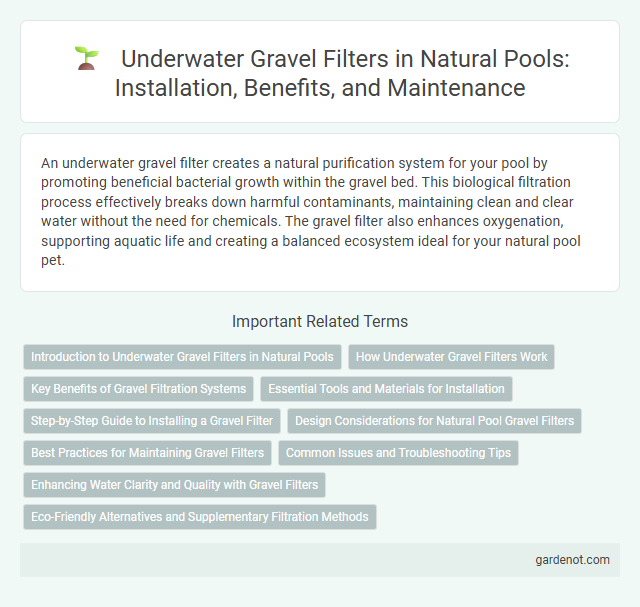An underwater gravel filter creates a natural purification system for your pool by promoting beneficial bacterial growth within the gravel bed. This biological filtration process effectively breaks down harmful contaminants, maintaining clean and clear water without the need for chemicals. The gravel filter also enhances oxygenation, supporting aquatic life and creating a balanced ecosystem ideal for your natural pool pet.
Introduction to Underwater Gravel Filters in Natural Pools
Underwater gravel filters in natural pools use layers of gravel to naturally purify water by facilitating biological filtration and trapping debris. This method enhances water clarity while supporting beneficial microbial activity, creating a balanced ecosystem without chemical additives. Properly designed gravel filters improve water quality by promoting nutrient absorption and oxygen exchange essential for aquatic life.
How Underwater Gravel Filters Work
Underwater gravel filters operate by allowing water to pass through layers of gravel, which act as a natural filtration medium by trapping debris and promoting beneficial bacterial growth. As water flows slowly through the gravel, harmful nutrients and contaminants are broken down biologically, maintaining the natural pool's clarity and ecosystem balance. This filtration process supports a chemical-free environment, enhancing water quality and reducing the need for mechanical intervention.
Key Benefits of Gravel Filtration Systems
Underwater gravel filters in natural pools provide superior biological filtration by supporting beneficial bacteria that break down organic waste, ensuring clear and clean water. These gravel filtration systems enhance oxygen circulation and maintain balanced water chemistry, reducing the need for chemical treatments. Their eco-friendly design promotes sustainable water purification while preserving the natural ecosystem of the pool.
Essential Tools and Materials for Installation
Underwater gravel filters require high-quality, coarse gravel and fine sand to ensure effective biological and mechanical filtration in natural pools. Durable perforated pipes and geotextile fabric are essential for preventing debris clogging while facilitating water flow through the filter bed. Proper installation tools include shovels, levels, and water pumps to precisely position and test the filter system for optimal performance.
Step-by-Step Guide to Installing a Gravel Filter
Installing an underwater gravel filter in a natural pool begins by selecting a suitable location near the pool's circulation system to ensure efficient water flow. First, lay a perforated pipe at the base of the pool's filtration zone, then cover it evenly with a layer of coarse gravel to trap debris while promoting water circulation. Secure the gravel layer by adding a fine mesh fabric on top, preventing sediment infiltration and maintaining optimal filtration efficiency.
Design Considerations for Natural Pool Gravel Filters
Underwater gravel filters in natural pools require precise design considerations to ensure effective water purification and ecosystem balance. Key factors include gravel size distribution, with layers ranging from coarse to fine to optimize mechanical filtration and microbial activity. Proper hydraulic flow rates must be maintained to prevent clogging while maximizing the filtration surface area and promoting beneficial bacteria growth.
Best Practices for Maintaining Gravel Filters
Regular backwashing of the underwater gravel filter is essential to prevent clogging and maintain water clarity in natural pools. Periodic inspection and removal of accumulated debris ensure optimal filtration performance and prolonged filter longevity. Using appropriately sized gravel and maintaining consistent water flow rates boost biological filtration and support a balanced aquatic ecosystem.
Common Issues and Troubleshooting Tips
Underwater gravel filters in natural pools often face clogging due to accumulated debris and organic matter, which reduces water flow and filtration efficiency. Regular backwashing and manual removal of trapped particles can prevent blockages and maintain optimal performance. Monitoring water clarity and pressure differentials helps identify early signs of filter malfunction for timely troubleshooting.
Enhancing Water Clarity and Quality with Gravel Filters
Underwater gravel filters significantly enhance water clarity and quality in natural pools by effectively trapping debris and promoting beneficial microbial activity. The porous structure of the gravel facilitates biological filtration, breaking down organic matter and reducing nutrient buildup that causes algae growth. Integrating these filters supports a balanced aquatic ecosystem, resulting in clearer, cleaner water without the use of harsh chemicals.
Eco-Friendly Alternatives and Supplementary Filtration Methods
Underwater gravel filters provide an eco-friendly alternative for natural pools by utilizing layers of gravel to biologically purify water without chemicals. This method supports sustainable filtration through beneficial microbial activity, enhancing water clarity and quality. Supplementary filtration techniques, such as aquatic plants and UV sterilizers, can be integrated to further improve water hygiene while maintaining environmental balance.
Underwater gravel filter Infographic

 gardenot.com
gardenot.com